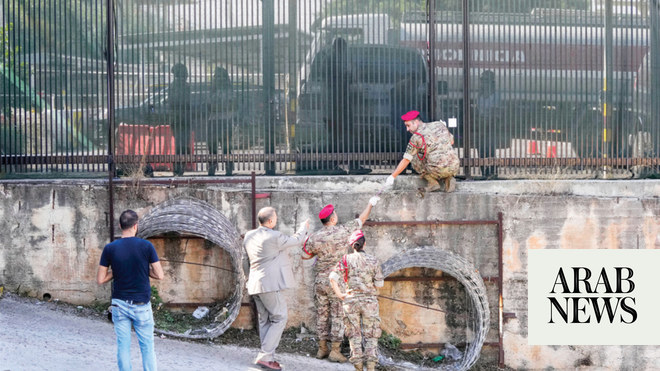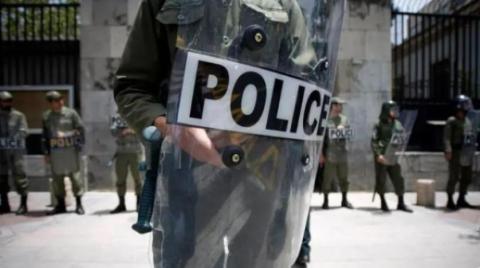
Surveillance cameras showed a lone gunman dressed in black firing a Kalashnikov rifle before fleeing the scene on a motorcycle
Embassy spokesman Jake Nelson: There were no injuries and our facility is safe
BEIRUT: Lebanese security forces are investigating a late-night gun attack on the US Embassy in Beirut in which more than a dozen shots were fired.
The diplomatic mission said that no one was hurt in the incident late on Wednesday.
Surveillance cameras showed a lone gunman dressed in black firing a Kalashnikov rifle before fleeing the scene on a motorcycle.
Embassy spokesman Jake Nelson said: “There were no injuries and our facility is safe,” adding that the mission was in “close contact” with local law enforcement.
Lebanese military police marked at least five bullet holes in the wall next to the embassy entrance.
The military judiciary has taken over the investigation into the attack.
A judicial source told Arab News that the shooting was likely “a political message to the embassy rather than a security incident.”
The source said that a bag had been found near the embassy’s perimeter, but “its contents or possible connection to the incident remain undisclosed.”
No group has claimed responsibility for the attack on the heavily guarded compound.
The Lebanese army has beefed up security around the site.
An army checkpoint, hundreds of meters away, monitors anyone using the road.
Reformist MP Melhem Khalaf described the incident as “an extremely dangerous and unacceptable attack, reflecting both the fragility of the security situation on the one hand and an unprecedented audacity in conveying messages on the other, as if we have become a banana republic.”
Khalaf said: “In order to nip in the bud any conspiracy or any rogue security project that may target Lebanon, the judiciary and security services must act immediately to identify the perpetrators, arrest them, and impose the harshest penalties on them.”
The head of the Lebanese Kataeb Party, MP Samy Gemayel, said: “Checkpoints, identity checks and shots fired at embassies are scenes that the Lebanese people want to eliminate by building a respected state. Beware of the escalation of these incidents, as they will not be in anyone’s interest, especially those who instigate them.”
MP Ziad Hawat warned against “playing with fire at this critical and sensitive moment,” adding that “Lebanon can no longer tolerate the policy of serving as a mailbox and sending messages to serve foreign interests.”
Independent Beirut MP Fouad Makhzoumi said: “The US has always stood by Lebanon and its people, supported and backed it in all circumstances and during the most difficult ordeals it has faced.”
The attack and “other such suspicious practices, tarnish the true image of Lebanon and do not represent it in any way, jeopardizing its international relations,” he said.
Alfred Riachi, secretary-general of the Permanent Conference of Federalism, said: “The message of the de facto forces has reached the Army Commander, Gen. Joseph Aoun.”
The embassy attack comes amid rumors circulating in Beirut regarding US opposition to a French initiative to hold talks between rival Lebanese paries on the election of a president.
The divided Lebanese parliament, with Hezbollah supporters and Christian parties opposed to its candidate Suleiman Frangieh, has been unable to secure a quorum for any candidate.
The year-old presidential vacuum could now extend to key positions of power, including the army command, presidency of the Supreme Judicial Council, and governorship of the central bank, all of which are Christian positions.
In an address to mark International Day of Peace on Thursday, Joanna Wronecka, the UN special coordinator for Lebanon, warned that “the presidential vacuum, the political impasse, and a protracted socioeconomic and financial crisis were undermining the ability of state institutions to deliver, widening the gap of poverty and inequality, and imperiling the country’s stability.
“The deepening political polarization and intransigence is threatening Lebanon’s social cohesion and the sense of belonging among its people. Political leaders must act in the national interest, and seek real and practical solutions for a better future for their country,” she said.









